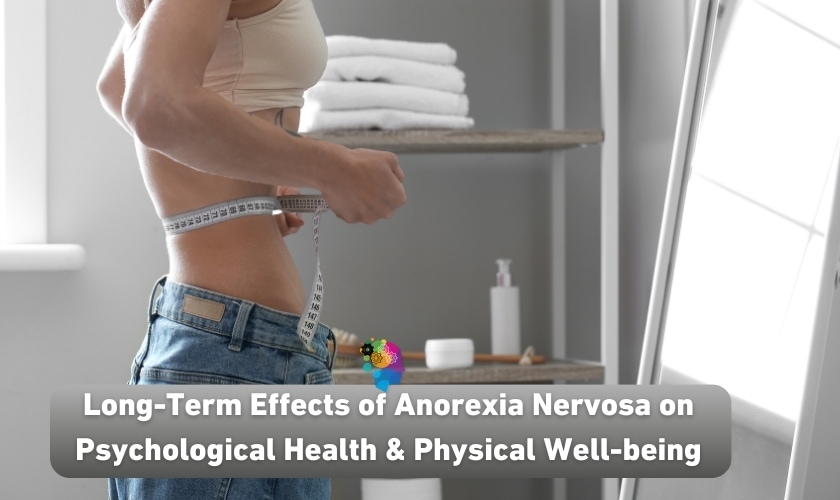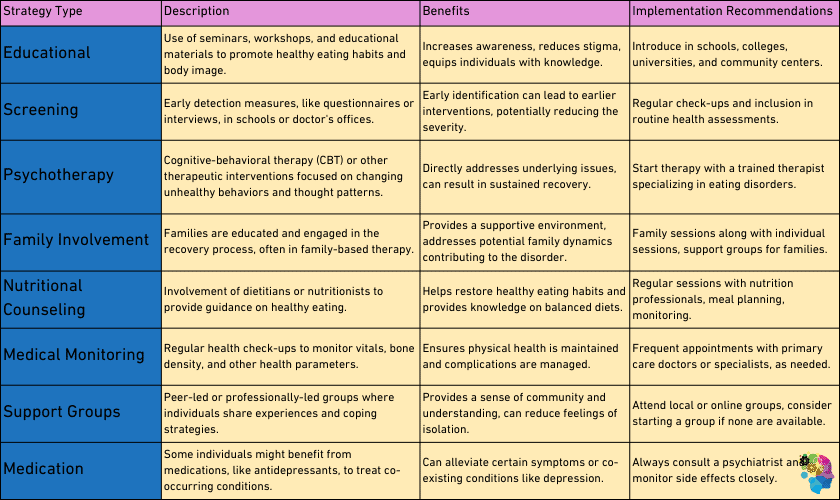In today's fast-paced world, finding moments of mindfulness can be a challenge. Embracing "The Power of Now"...

Long-Term Effects Of Anorexia Nervosa
- Mood disorders
- Personality disorders
- Self-injury
- Suicidal thoughts
- Suicidal attempts
- Substance misuse
- Can lead to fractures and deformities of the spine
- Cardiovascular complications
- Can develop several nutritional deficiencies
- Can suffer from gastrointestinal complications
- Menstrual cycle can be disrupted
- Can lead to sexual dysfunction
The long-term effects of anorexia nervosa, a serious eating disorder, include significant impacts on an individual's physical health and psychological well-being. This article delves into the long-term consequences of anorexia nervosa on mental health, as well as its physical health ramifications. Additionally, we will discuss strategies for prevention and recovery, focusing on the crucial roles of early intervention and effective treatments.


Anorexia nervosa can have a wide range of psychological effects on an individual. The most prevalent mental disorder types are mood disorders like depression and anxiety[2]. Among them, the most common type is Depression, with a prevalence rate of approximately 40–45%, followed by a range of anxiety disorders with a prevalence rate of 60%[2].
Research indicates that individuals who suffer from anorexia nervosa are also more likely to have personality disorders [2]. The most common type of personality disorder is obsessive-compulsive disorder, followed by borderline personality disorder[12].
Studies show that suicidal attempts in AN patients are common, with estimated ranges of 3.0% to 29.7%[13]. Major depression is the most common psychiatric comorbidity associated with suicidal attempts, followed by borderline personality disorder and substance abuse [14] .
Studies show that patients with binge-eating/purging anorexia nervosa may misuse alcohol and substances although they are afraid of gaining weight, while patients with restricting anorexia nervosa may not use substances because of their strict dieting regimens and control over food intake[15]. The misuse of alcohol and substances also increases the risk of suicidal behavior in AN patients, as substance abuse can lead to impaired judgment and impulsivity[17].
Long-term denial of food intake affects many physiological systems, including the bones. Anorexia nervosa increases the risk of low bone mineral density (BMD) [1], osteopenia (loss of bone calcium), and osteoporosis (a progressive loss of bone density), which are conditions that can lead to fractures and deformities of the spine [2].

Research reveals that 80% of patients with eating disorders suffer from cardiovascular complications[2]. Severe anorexia nervosa can lead to an irregular heartbeat, arrhythmia, abnormally low blood pressure, and a decreased heart rate[2]. It is also associated with an increased risk of heart failure, which can be life-threatening [3].
A person suffering from eating disorders usually has a poor diet and can develop several nutritional deficiencies; the most common deficiencies are zinc and Vitamin D, followed by copper, selenium, and vitamin B1 [4]. These vitamin deficiencies can lead to anemia, a weakened immune system, poor bone health, and can even interfere with the metabolism of essential fatty acids and carbohydrates [5].
This eating disorder can also cause significant damage to the gastrointestinal system. Anorexia Nervosa patients can suffer from gastrointestinal complications such as hypokalemia, hypomagnesemia, and hypocalcemia [2]. Refeeding to gain weight can cause further gastrointestinal problems, such as bloating, distention, and abdominal cramps[2].
Anorexia Nervosa can have serious effects on reproductive health. In women, the menstrual cycle can be disrupted or cease completely due to significantly low body weight[6]. Long-term reproductive health risks include infertility and pregnancy complications [6]. Further, the offspring of women with anorexia may be at a higher risk for malformations or low birth weight, as maternal undernutrition during pregnancy can affect the development of the fetus[6].
In men, anorexia can lead to sexual dysfunction as low testosterone levels, and depleted energy reserves can cause a lack of interest in sex or erectile dysfunction [7]. It can also cause decreased muscle mass, infertility, and an inability to gain weight caused by decreased metabolism and energy intake[7].

Early detection and intervention can help individuals with anorexia nervosa to prevent further psychological and physical damage. Treatment for anorexia nervosa typically includes a combination of psychotherapy and medical interventions, depending on the severity of symptoms. Psychotherapeutic intervention includes [10];
In addition to psychotherapeutic treatments, nutritional counseling can help individuals struggling with disordered eating habits to make healthier food choices and ultimately return to a healthy weight[11].
In extreme cases, hospitalization or residential care may be necessary for individuals who are severely underweight and at risk of medical complications[9].
Many online resources, support groups, and hotlines are available to individuals struggling with disordered eating. Listed are some of them.
The mental health community takes Anorexia Nervosa seriously due to its high prevalence rate and the immense danger this condition poses over time. It is important to seek professional help if you or someone you know has signs or symptoms of anorexia. Proper treatment is necessary for a successful recovery and achieving a healthy lifestyle.
Yes. In some cases, when the patient's weight can not be restored, anorexia can cause permanent damage to the body, such as weakened bones, malnutrition, and organ failure. However, with proper treatment and support, most people with anorexia can make a full recovery.
In extreme cases, yes. Anorexia can cause serious damage to the brain due to long-term malnutrition and dehydration. If left untreated, anorexia can cause permanent brain damage and even death. In most cases, however, with proper treatment and support, people with anorexia can make a full recovery.
⚠️Disclaimer: The information provided on this health blog is for informational purposes only and is not intended as a substitute for professional medical advice, diagnosis, or treatment. Always seek the advice of your physician or other qualified health provider with any questions you may have regarding a medical condition.
In today's fast-paced world, finding moments of mindfulness can be a challenge. Embracing "The Power of Now"...
In our fast-paced world, finding moments of tranquility can be a challenge. Meditation apps offer a convenient...
In our fast-paced world, taking time for self-reflection and mindfulness is essential for well-being. Journaling can be...
In today’s fast-paced world, managing stress has become an essential aspect of maintaining overall well-being. Two popular...
Dissociation can be a challenging experience, especially the one that happens at work. Are you experiencing dissociation?...
Bionic reading transforms the reading experience for ADHD individuals by guiding the eyes for focus and understanding. Dive into the world of bionic reading.
Explore the complexities of postpartum depression and genetics in our blog 'Is Postpartum Depression Hereditary?' for insights into maternal mental health.
